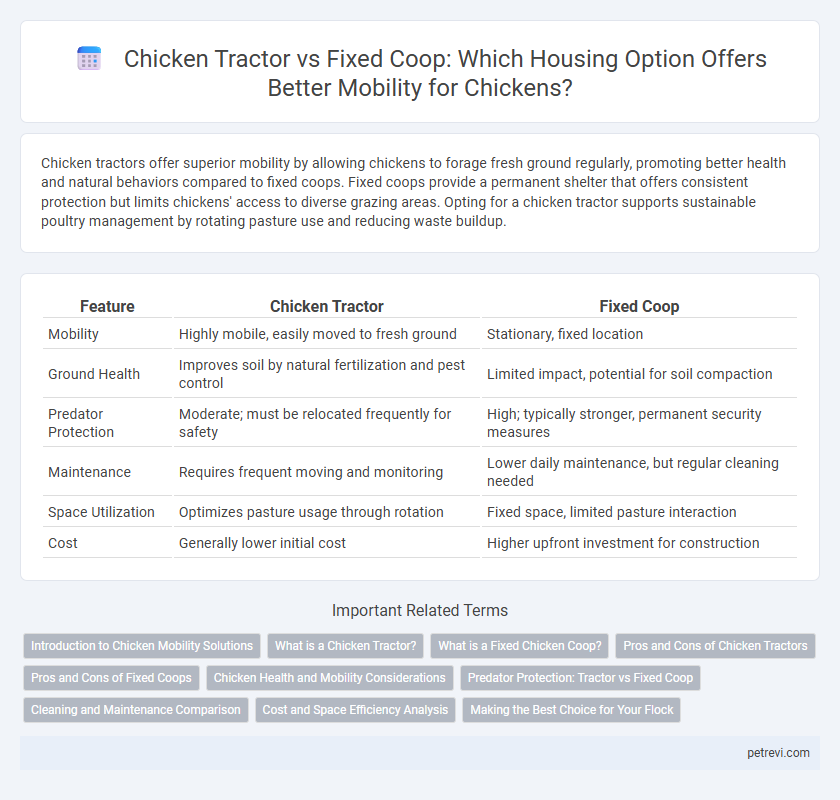Chicken tractors offer superior mobility by allowing chickens to forage fresh ground regularly, promoting better health and natural behaviors compared to fixed coops. Fixed coops provide a permanent shelter that offers consistent protection but limits chickens' access to diverse grazing areas. Opting for a chicken tractor supports sustainable poultry management by rotating pasture use and reducing waste buildup.
Table of Comparison
| Feature | Chicken Tractor | Fixed Coop |
|---|---|---|
| Mobility | Highly mobile, easily moved to fresh ground | Stationary, fixed location |
| Ground Health | Improves soil by natural fertilization and pest control | Limited impact, potential for soil compaction |
| Predator Protection | Moderate; must be relocated frequently for safety | High; typically stronger, permanent security measures |
| Maintenance | Requires frequent moving and monitoring | Lower daily maintenance, but regular cleaning needed |
| Space Utilization | Optimizes pasture usage through rotation | Fixed space, limited pasture interaction |
| Cost | Generally lower initial cost | Higher upfront investment for construction |
Introduction to Chicken Mobility Solutions
Chicken tractors provide a versatile mobility solution by allowing chickens to graze fresh ground while being protected from predators, promoting natural foraging behavior and improving soil health. Fixed coops offer a stable, secure environment with consistent shelter but restrict movement, potentially limiting chickens' access to diverse nutrients and outdoor exercise. Evaluating chicken mobility solutions involves balancing the benefits of rotational grazing in tractors against the convenience and protection of stationary coops.
What is a Chicken Tractor?
A chicken tractor is a movable, roofed enclosure without a floor that allows chickens to forage on fresh ground while being protected from predators. Unlike fixed coops, chicken tractors promote natural behaviors by providing access to fresh grass, insects, and soil, which enhances flock health and reduces feed costs. This mobility supports pasture rotation, helping maintain yard cleanliness and preventing soil depletion.
What is a Fixed Chicken Coop?
A fixed chicken coop is a stationary, enclosed structure designed to house chickens securely in one location, providing shelter from predators and weather conditions. Unlike a chicken tractor, it lacks portability, often featuring permanent foundations and built-in nesting boxes for egg-laying hens. Fixed coops typically offer better protection and space customization, making them ideal for long-term poultry housing.
Pros and Cons of Chicken Tractors
Chicken tractors offer enhanced mobility, allowing chickens to access fresh forage and reduce soil compaction by frequently moving their range. They promote healthier chickens by providing better ventilation and protection from predators compared to traditional fixed coops. However, chicken tractors require regular relocation and maintenance, which can be labor-intensive, and they may offer limited space compared to stationary coops.
Pros and Cons of Fixed Coops
Fixed coops offer superior protection from predators and harsh weather, providing a secure environment for chickens to live and lay eggs. Their solid structure reduces maintenance frequency and allows for added features like nesting boxes and feeders, but fixed coops limit mobility, increasing the risk of soil depletion and parasite buildup in one area. While stationary housing promotes stability and ease of management, lack of mobility may impact flock health compared to mobile chicken tractors that allow pasture rotation.
Chicken Health and Mobility Considerations
Chicken tractors promote better chicken health by allowing constant access to fresh forage and reducing parasite buildup through mobility, while fixed coops often lead to accumulated waste that can harbor harmful bacteria. Mobility in chicken tractors encourages natural behaviors like scratching and dust bathing, which improve overall well-being and reduce stress-related illnesses. Fixed coops may limit space and movement, increasing the risk of leg problems and respiratory issues due to poor ventilation and overcrowding.
Predator Protection: Tractor vs Fixed Coop
A chicken tractor offers limited predator protection due to its portable design, which can be more vulnerable to digging predators and strong animal attacks. Fixed coops provide enhanced security with solid, permanent structures featuring reinforced mesh and secure latches that effectively deter foxes, raccoons, and other common predators. Optimal predator defense combines sturdy fixed coops with mobile tractor runs enclosed by buried fencing to prevent digging and climbing predators.
Cleaning and Maintenance Comparison
Chicken tractors offer superior ease of cleaning and maintenance due to their portable design, allowing for frequent relocation that naturally reduces waste buildup and soil degradation. Fixed coops require more intensive cleaning efforts as waste accumulates in a single area, increasing the risk of odor and pest problems. Regularly moving chicken tractors promotes healthier living conditions and reduces the frequency of deep cleaning compared to stationary coops.
Cost and Space Efficiency Analysis
Chicken tractors offer significant space efficiency by allowing chickens to access fresh ground while reducing the need for large fixed enclosures, which often require more land and permanent infrastructure. Cost-wise, chicken tractors typically have lower initial investment and maintenance expenses due to their portability and reduced need for extensive materials compared to fixed coops. However, fixed coops provide better long-term protection from predators and weather, which may justify their higher upfront and repair costs depending on the farming scale and location.
Making the Best Choice for Your Flock
A chicken tractor offers enhanced mobility by allowing your flock to access fresh grass and insects daily, promoting healthier chickens and natural fertilization of your soil. In contrast, a fixed coop provides a permanent, secure shelter that requires less frequent relocation but limits your chickens' grazing options. Choosing between these depends on your land size, management style, and the balance you want between mobility and stability for optimal flock health.
Chicken Tractor vs Fixed Coop for Chicken Mobility Infographic

 petrevi.com
petrevi.com